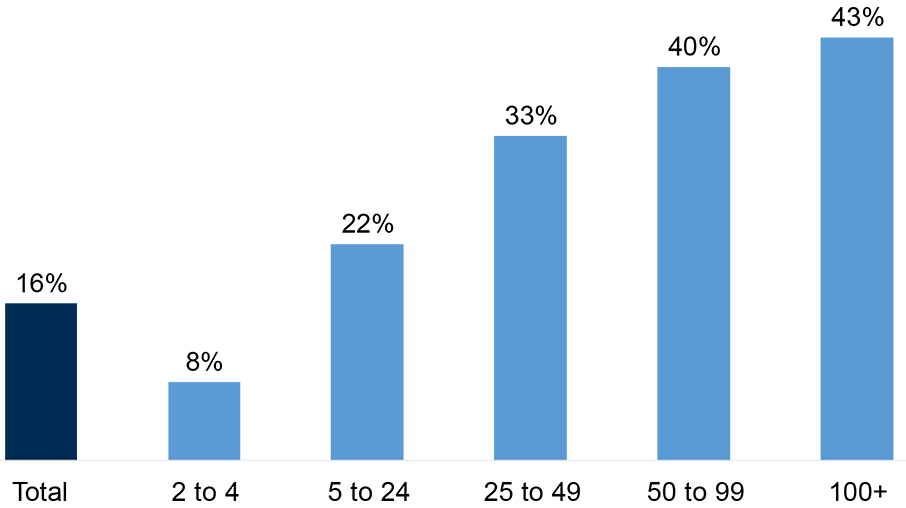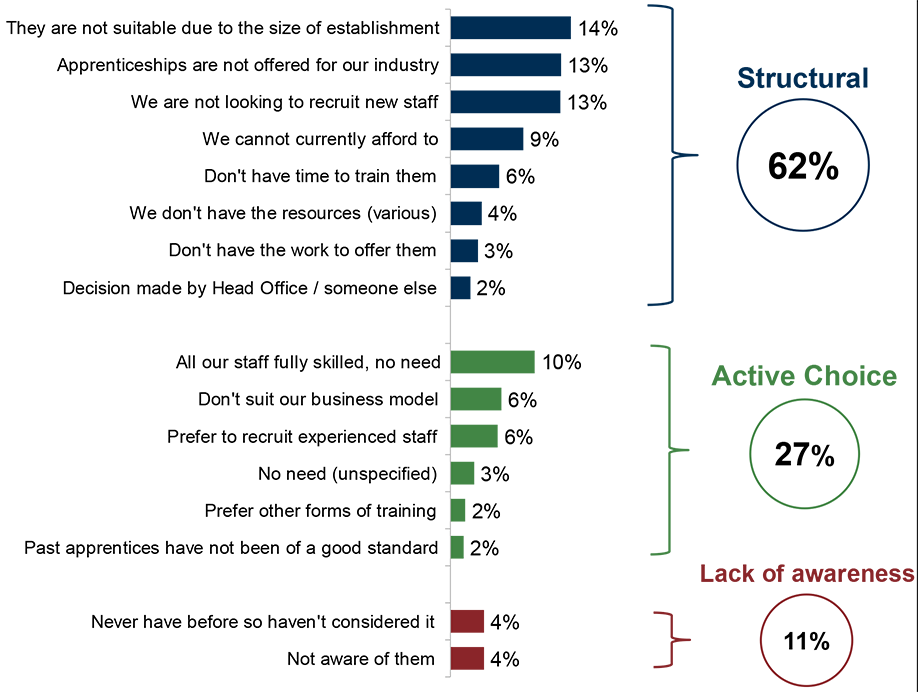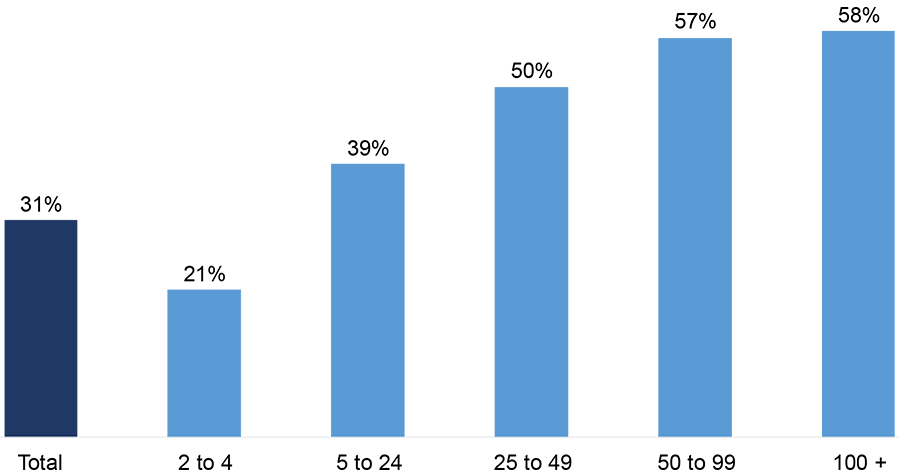UK Employer Skills Survey 2022 – Scotland Report
Publication of Scotland results from the UK Employer Skills Survey 2022.
Apprenticeships
This chapter explores the extent to which employers are offering apprenticeships, their reasons for choosing to offer or not to offer apprenticeships, who employers are offering apprenticeships to, and whether they plan to offer apprenticeships in the future.
When discussing ‘formal apprenticeships’, this would include apprenticeships that follow a formal framework or standard, and lead to a nationally recognised qualification.
Offering formal apprenticeships
Around one in six (16%) Scottish employers offered formal apprenticeships in 2022.
This includes 10% of Scottish employers that currently employ apprentices. The proportion of employers offering apprenticeships is more generally consistent with previous years (2016 and 2019), with no statistically significant decrease since 2021 (see Table 11).
For the remainder of this chapter, ‘offering’ apprenticeships refers to both employers who have current apprenticeships and those who offer them but do not currently have them.
The proportion of employers offering apprenticeships in 2022 was consistent with all previous years (2016, 2019 and 2021) .
| 2014 | 2016 | 2019 | 2021 | 2022 | |
| Proportion of employers offering apprenticeships | 14% | 15% | 16% | 19% | 16% |
Base: All establishments in Scotland (2014: 4,015; 2016: 4,009; 2019: 2,652; 2021: 1,000; 2022 (Module A): 1,325).
The likelihood of offering apprenticeships tended to increase with employer size, ranging from 8% of employers with 2 to 4 staff offering them to 43% of employers with 100 or more employees. This trend by employer size is consistent with previous years. Employers in the Education (37%) and Construction (36%) sectors were more likely than average to offer apprenticeships.
The proportion of employers offering apprenticeships increased with establishment size.

Base: All establishments in Scotland (Module A) (1,325).
Employers who were not currently offering formal apprenticeships were asked the reasons for not doing so. The most common reason given was that apprenticeships were not suitable for their establishment size (14%). Establishments with 2 to 4 employees were most likely to cite this as a reason for not offering apprenticeships than other size groups (18%). The proportion of employers citing unsuitability due to establishment size has increased to 14% since 2021 (from 10%).
Other common reasons given for not offering apprenticeships included them not being offered in their industry (13%), and employers not looking to recruit new staff (13%). Again, establishments with 2 to 4 employees were more likely than other size groups to mention not looking to recruit as their reason for not offering apprenticeships (16%).
As Figure 28 shows, when grouped into broader categories, structural reasons were the most common type of barrier to offering apprenticeships (62%). More than a quarter of employers (27%) made an active choice not to offer apprenticeships, while over one in ten (11%) cited reasons suggesting a lack of awareness about apprenticeships. These findings remained broadly in line with 2021. The proportion of employers citing reasons related to COVID-19 was 2%, a decrease from 8% in 2021.
Employers were most likely not to offer apprenticeships due to structural reasons

reasons for not currently offering apprenticeships in 2022
Base: Employers who do not currently offer formal apprenticeships in Scotland (Module A) (1,032). Figure only shows reasons mentioned by at least 2% of those asked.
Key characteristics of current apprenticeship offering
Almost all apprenticeship employers (92%) offer them to young people under the age of 25, similar to 2021 (90%).
However, employers did not exclusively offer apprenticeships to young people, with around half (49%) offering them to people aged 25 and above. Only 3% of employers offered apprenticeships solely to those aged 25 and over.
Three-quarters of employers who were offering apprenticeships (76%) had been offering them for more than three years, including 41% that had been offering them for more than 10 years. Around a fifth (19%) of employers offering apprenticeships had been doing so for 3 years or less.
A greater proportion of employers offered apprenticeships to those under 25. A greater proportion of employers also offered apprenticeships to new recruits compared to existing employees.
| Apprenticeship group | Proportion of employers with apprenticeships who offer to this group | |
|---|---|---|
| Age group | 2021 | 2022 |
| Under 25 | 90% | 92% |
| Exclusively under 25 | 36% | 46% |
| Aged 25 and above | 57% | 49% |
| Exclusively aged 25 and above | 3% | 3% |
| Unknown | 7% | 5% |
Base: All establishments who have/offer formal apprenticeships in Scotland (2021: 265; 2022: 293).
A larger proportion of employers recruited people to do apprenticeships (87% of those offering them) than offered them to existing employees (52%). Offering apprenticeships to existing employees was less common than in 2021 (62%). Fewer employers offered apprenticeships to both new recruits and existing employees compared to 2021 (40% compared to 55%), with employers in 2022 more likely to exclusively offer apprenticeships to new recruits (47% compared to 36% in 2021). Around one in ten (11%) solely offered them to existing employees (7% in 2021). Table 13 shows a summary of who employers offered apprenticeships to.
| Employment group | Proportion of employers with apprenticeships who offer to this group | |
|---|---|---|
| Age group | 2021 | 2022 |
| Any new recruits | 91% | 87% |
| Any existing employees | 62% | 52% |
| New recruits or existing employees | 55% | 40% |
| Exclusively new recruits | 36% | 47% |
| Exclusively existing employees | 7% | 11% |
| Unknown | 2% | 2% |
Base: All establishments who have/offer formal apprenticeships in Scotland (2021: 265; 2022: 293).
Employers who had started offering apprenticeships in the last three years were asked who first approached them about offering them. For over three-fifths of employers (62%), it was a decision they actively made themselves. A quarter of employers (25%) had been approached by someone externally. A small proportion of employers (7%) said it was a combination of them initiating the offering of apprenticeships as well as being approached by individuals or organisations.
Future apprenticeship plans
Three in ten employers (31%) plan to either continue offering or start offering apprenticeships in the future.
This is lower than the 40% who reported wanting to offer apprenticeships in future in 2021 but remains higher than in 2019 (26%) and 2016 (25%). Over half of employers (53%) do not plan on offering apprenticeships in the future.
The majority of employers who currently offer apprenticeships plan to continue to do so (89%). A fifth of employers (20%) who do not currently offer apprenticeships are planning to start offering them in future, a decrease from 28% in 2021.
The likelihood of employers planning to offer apprenticeships in the future increases with establishment size, as shown in Figure 29, ranging from 21% of employers with 2 to 4 staff to 58% of those with 100 or more employees. By sector, employers in Education (53%) and Construction (48%) were more likely to plan to offer them in the future compared to other sectors, in part due to them being more likely to offer them already.
The proportion of employers planning to offer apprenticeships in the future Increased by establishment size.

Base: All establishments in Scotland (Module A) (1,325).
Contact
Email: FHEstatistics@gov.scot
There is a problem
Thanks for your feedback